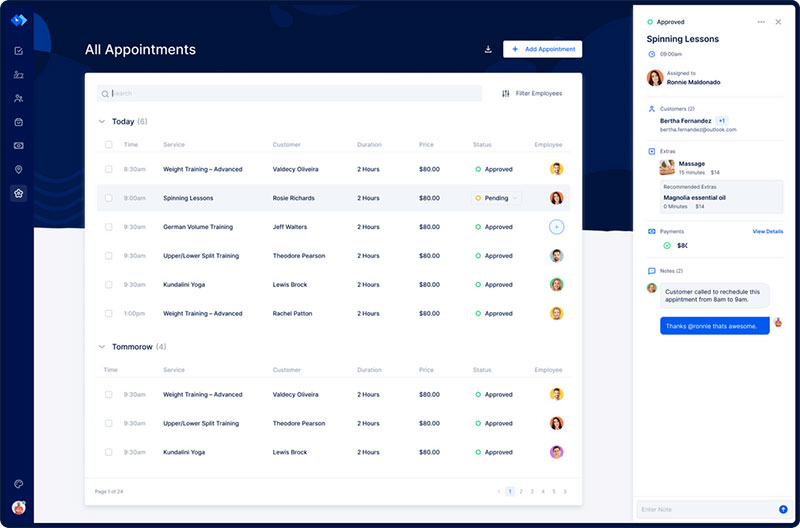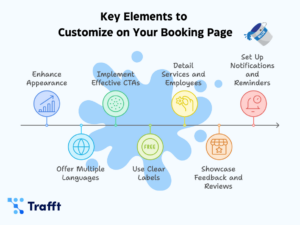The quick answer is that businesses selling physical or tangible items are product-based, whereas businesses that sell non-tangible products such as services are service-based businesses. The problem with this definition is that it barely touches the surface of the differences between the two. They have debated service business vs product business for years. It’s important to clarify these differences for service and product-based businesses everywhere.
Understanding the differences is especially important when selecting your pricing point or when outlining your business model. To begin, we will find the differences between these two main styles of business.
Service Business vs Product Business: What Is the Biggest Difference?
All product-based businesses focus on innovating and introducing their products to the market. This means they need to sell products that not only have high market value but also meet the needs of their clients. They select materials to produce the best quality products. They strive to improve their products with more or new features.
Service-based businesses use their expertise to provide services for their clients. This business model needs less start-up money t because there’s no need to invest money into producing items. Instead, it only needs equipment that allows you to provide service to your clients.
These business services are often exclusive. They make services to the specifications of their clients. Those services are rarely shared between clients.
These businesses differ in significant ways, and there are pros and cons to each. Choosing a service business can provide an entrepreneur with the ability to make money almost instantly. As an example, copywriters can make content for clients almost immediately when they open their business. In contrast, an entrepreneur with a physical product requires funding to make and promote their product before making money.
Business Risk

Business risk refers to factors that can threaten a business’s financial goals. These risks could vary from negligible to critical, but no matter what, owners should review risks in their business’s early stages.
The owner of a product business will set their own standards, instead of the customer. Although the customer has a very important role in the business, the power to make the final decision lies in the owner’s hand.
Service businesses have an initial risk of establishing credibility in the market.
Recurring Revenue
Your product will always need to find new clients and create new products to generate profits for your business. This can still be quite lucrative, but slightly less consistent.
In contrast, service businesses have the benefit of potential recurring revenue from clients. Customers often will want to stick with the same company because of familiarity. This helps companies because they can consistently predict revenue. While the company continues to grow, income will multiply as well.
Relationship with Clients
One of the biggest differences between a service business vs product business is their relationships with clients.
Product businesses often have to make and maintain a brand reputation instead of building relationships with their customers. They focus their efforts on building the market position of their product to increase sales.
Service businesses focus their efforts on building a personal relationship with their customers. This is necessary for smaller marketing areas, as unhappy clients may switch to another company if they don’t feel connected to the business. A service-based business needs to build credibility through its relationships with customers to increase sales.
They may have to invest in automation software like a CRM solution to track customer touch-points and boost engagement (this handy guide covers everything you should know about CRMs).
Your success story starts with a scheduling app to streamline your calendar
Staying organized has never been easier.
You can now manage your business and grow your brand with a single, powerful software that keeps all of your appointments in line, your clients organized and your business booming.
Trafft is perfect for business owners who need to streamline their booking experience both for their staff and their clients.
Trafft handles everything for you, even sending automated email or SMS reminders to your clients. No-shows? Not anymore!
The Trafft booking software adapts to different industries for a blissful online booking experience and employee management.
Want to know more? Check out Trafft’s awesome features to see what you are missing.
Financial Management
Product-based businesses have a lot to include in their planning for financial management. They have to consider their inventory, their supply costs, shipping, and even storage. Products have a lot of moving parts for finances, so more things to track.
Services are a lot easier to forecast and budget for. Providers will usually have lower overhead than more product-based businesses, so trimming expenses is easier. . Service providers make money by giving their time and expertise. They don’t need to worry about extra costs to produce tangible goods.
Service-based businesses are less expensive than product-based businesses because of the lack of inventory. Depending on their offerings, service-based businesses also rarely have to worry about physical locations. For example, podcast advertising companies can work on a fully remote basis. This can also save capital.
Marketing Message and Scope
Usually, product businesses have much grander marketing scopes than service-based companies. Product businesses have global marketing strategies that attract customers. This can give them an advantage over service businesses. Their ability to transport a tangible product across the world can help increase sales.
Customers can purchase a product in the global market via newspapers, the internet, magazines, or word of mouth. Service-based businesses place more focus on customer experience and customer satisfaction. Marketing a secure messaging app can emphasize the importance of secure and confidential communication to potential clients. The problem with this is that they are restricted to a small target market. If they cannot provide their services around the world, they will miss out on revenue.
Product-based businesses need to invest large amounts of money into advertising even their best quality products. The costs climb if they want to go global.
Product Quality vs. Customer Experience
For a product business, quality is the key to how much a product can grow. In contrast, a service business views its clients as key to where their growth lies. All companies want their clients to be satisfied with their services or products, or they won’t thrive.
In service businesses, clients expect to find expertise and an outstanding experience. If they don’t find it, they won’t return. Product businesses need to provide products that match the value that their customers expect. If they fail, customers may not buy the product again or even prevent prospective customers from making a purchase.
Hiring Candidates
Most product businesses hire candidates that are knowledgeable in their domain. Prospective employees need to be familiar with the newest technology products that they would need to use or sell. Product businesses put high
In a service business, communication skills are just as important as knowledge in the field. In certain cases, marketing and interpersonal skills are required to be hired for certain roles. Sometimes even a person’s style of dress can decide if they get the job.
Selling
Products have the singular goal of meeting the needs of a customer; if it does not meet those needs, customers will most likely return the item. With products, prospective customers can easily discern the product’s value and whether it’s worth the money to purchase. Customers can rate a product online, which can affect the customer base positively or negatively.
When selling a service, it’s crucial to highlight what makes your service special and how it can meet the customer’s needs. Most marketing services need to build relationships with their customers and customize their services to fit whatever the customer needs.
FAQs about service business vs product business
1. What is the primary difference between a service-based business and a product-based business?
The nature of what they sell is the main distinction between a service-based firm and a product-based business. Although a product-based business sells tangible goods to customers, a service-based business provides customers with intangible services.
2. Which type of business is easier to start, a service business or a product business?
Because there are often lower startup costs, launching a service-based firm is frequently simpler than beginning a product-based business. The startup costs of service-based firms may be lower, and inventory management requirements are frequently reduced.
3. What are some advantages of running a service-based business compared to a product-based business?
Running a service-based firm has the benefit of often being more adaptable than running a product-based business. While products have a fixed design, services can be tailored to each customer’s specific demands. In addition, since services may be delivered more quickly than items, turnaround times can be shortened.
4. Which type of business typically requires more capital to start: a service business or a product business?
In general, it costs more money to launch a product-based firm than a service-based business. A product-based corporation may need to make expensive investments in manufacturing facilities, machinery, supplies, and transportation.
All that may be needed to launch a service-based firm is a computer and an internet connection.
5. What are some challenges of running a product-based business that are different from those of a service-based business?
Running a product-based company can be more difficult than running a service-based company because of the complexity of managing inventory and the supply chain.
In order to remain competitive, product-based businesses may also need to continuously innovate and enhance their products, which may necessitate substantial investment in research and development.
6. What are some examples of industries that are primarily service-based businesses?
Consulting, accountancy, legal services, healthcare, education, and hospitality are a few examples of sectors that are predominantly service-based firms. These sectors sell services rather than tangible goods.
7. How does marketing differ for a service-based business versus a product-based business?
Marketing for service-based firms frequently entails forming connections and winning over potential customers’ confidence.
The use of networking, recommendations, and content marketing can accomplish this. Advertising and product demos may be used in the marketing of product-based firms to highlight the distinctive qualities and advantages of the goods.
8. What are some key factors to consider when deciding whether to start a service-based or product-based business?
While choosing between a service-based or product-based firm, it’s important to take into account a number of important aspects, such as the amount of startup capital needed, the complexity of the supplier risk management, the target market, and the level of industry competition.
9. What are some common revenue models for service-based businesses versus product-based businesses?
While revenue models for product-based firms often include selling tangible products at a markup, revenue models for service-based organizations frequently involve charging for hourly or project-based services.
Moreover, both kinds of companies might use subscription-based business models.
10. How does customer acquisition differ for service-based businesses versus product-based businesses?
Building relationships and word-of-mouth recommendations are frequent methods of customer acquisition for service-based organizations, whereas advertising and product demonstrations are frequent methods of customer acquisition for product-based firms.
Businesses that sell products could also need to spend money on packaging and branding to draw in customers.
Service Business Vs Product Business, Which Is Better?
Whether you are selling products or services, you will need a different mindset to manage each well. Creating products requires knowledge of customer needs and gaps in the market, and where your product fits in. You need to invest both time and money into taking a product from idea to reality.
Service-based businesses need knowledge of what intangible services customers need.
Both of these businesses have challenges like high production costs or small target markets. If you want to make it in either of these businesses, you will need to understand your target market and have a business plan that will meet its demands. Choosing the right service business vs product business can be extremely profitable if done right. Make sure that you know the differences and characteristics of each to start your business venture.
There’s evidence that even businesses selling what should be one-off items are incorporating RR into their practices.
The costs of gaining and retaining clients for a service business can be quite high. Research turns up many reasons for service businesses to spend on marketing.
Communication skills are vital in producing and selling products. “conveying ideas effectively” is the same as communication. The sentence contradicts itself and is flatly untrue.
Conflicts with earlier statements about service businesses not needing marketing.
If you liked this article on service business vs product business, you should also check out this one with service business websites.
We also wrote about similar topics like how to market a service business, how to scale a service business, how to sell a service business, how to run a service business, service businesses with low startup costs, and services landing page designs.




